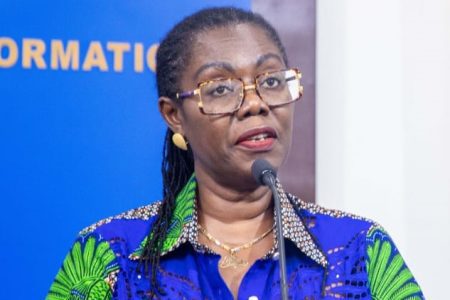The Ministry of Communications and Digitalisation has officially unveiled the Ghana Digital Economy Policy and Strategy, a landmark initiative aimed at solidifying the country’s digital transformation and establishing its leadership in Africa’s digital future.
The policy sets ambitious goals, including increasing the digital economy’s contribution to Ghana’s GDP from 4.4% in 2020 to 5.3% by 2025, by focusing on five critical areas: Universal Access and Connectivity, Digital Government, Digital Skills and Research, Digital Entrepreneurship, and Data and Emerging Technologies.
Transforming the economy with digital technologies
Launching the strategy at the Ministry of Information, Minister Ursula Owusu-Ekuful emphasized its transformative potential, highlighting opportunities in job creation, entrepreneurship, and public service efficiency.
“Through the application of digital technologies, we are confident of seeing significant progress in these areas, ensuring the digital economy contributes meaningfully to GDP growth,” she said.
The Minister also acknowledged the need for adaptive and collaborative regulation, stating that governance should focus on outcomes rather than methods to foster innovation while safeguarding against risks like fraud and misinformation.
Key achievements and future plans
Mrs. Owusu-Ekuful highlighted milestones such as the 3,500 kilometers of fiber optic cables laid in 2023, connecting 951 public institutions via a high-speed eGovernment network.
These developments, she noted, are key to bridging the digital divide and ensuring equitable access to resources.
To further enhance access, the Ghana.gov portal and Citizens App have been launched, offering streamlined public services and fostering transparency.
The Minister also revealed plans for public awareness campaigns in local dialects to address challenges like mobile fraud and misinformation, underlining the importance of digital literacy.
Collaboration and investment
The policy’s success, Mrs. Owusu-Ekuful stressed, requires cross-sector collaboration and increased private-sector and donor investment.
This funding will bridge connectivity gaps and expand access to underserved and unserved communities.
Support from organizations such as the World Bank and the Tony Blair Institute has been instrumental in shaping the policy.
Vision for the future
By aligning digital initiatives with job creation and GDP growth, the policy aims to position Ghana as a leader in Africa’s digital age.
“This roadmap ensures a prosperous digital future for all Ghanaians,” the Minister concluded.
The Ghana Digital Economy Policy and Strategy underscores the government’s commitment to leveraging technology as a driver of inclusive growth, poverty reduction, and national development.
By SELORM GBORBIDZI, Accra
- Enterprise Life launches improved education investment solution - 31 March 2025
- Access Bank Ghana launches “Fa Ketewa Bɛgye Kɛseɛ” promo - 31 March 2025
- President Mahama Calls for unity at Eid Al-Fitr celebration - 31 March 2025

